External links
- (in Portuguese) Portuguese Government biography
| This article about a Portuguese politician is a stub. You can help Wikipedia by expanding it. |
Maria do Carmo Seabra (born 27 January 1955) is a Portuguese politician.
Born in Lisbon, she served as Minister of Education in the 2004–2005 government of fellow Social Democrat Pedro Santana Lopes.
She is currently a lecturer of Principles of Microeconomics at Nova School of Business and Economics. [ citation needed ]
| This article about a Portuguese politician is a stub. You can help Wikipedia by expanding it. |

Prime Minister is the current title of the head of government of Portugal. As head of government, the Prime Minister coordinates the actions of ministers, represents the Government of Portugal to the other bodies of state, is accountable to Parliament and keeps the President informed. The Prime Minister can hold the role of head of government with the portfolio of one or more ministries.

Dona Maria I was Queen of Portugal from 1777 until her death in 1816. Known as Maria the Pious in Portugal and Maria the Mad in Brazil, she was the first undisputed queen regnant of Portugal and the first monarch of Brazil. With Napoleon's European conquests, her court, then under the direction of her son João, the Prince Regent, moved to Brazil, then a Portuguese colony. Later on, Brazil would be elevated from the rank of a colony to that of a kingdom, with the consequential formation of the United Kingdom of Portugal, Brazil and the Algarves.
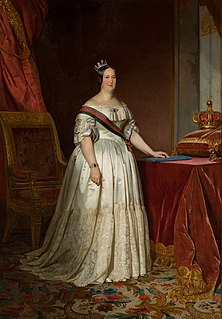
DonaMaria II "the Educator" or "the Good Mother", reigned as Queen of Portugal from 1826 to 1828, and again from 1834 to 1853. Born in Rio de Janeiro, she was the first child of Emperor Pedro I of Brazil and of his first wife, Empress Maria Leopoldina, and thus a member of the House of Braganza. One of the two surviving children born when Pedro was still heir apparent to Portugal, she inherited Portuguese titles and was placed in the line of succession to the former Portuguese throne, even after becoming a member of the Brazilian Imperial Family, from which she was excluded in 1835 after her definitive ascension to the Portuguese throne.

The Most Serene House of Braganza, also known as the Brigantine Dynasty, is a dynasty of emperors, kings, princes, and dukes of Portuguese origin which reigned in Europe and the Americas.

Maria de Lourdes Ruivo da Silva de Matos Pintasilgo was a Portuguese chemical engineer and politician. She was the first and to date only woman to serve as Prime Minister of Portugal, and the second woman to serve as Prime Minister in Western Europe, after Margaret Thatcher.
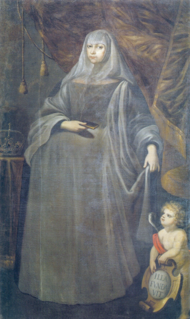
Dona Maria Francisca of Savoy was twice queen consort of Portugal as the spouse of two Portuguese kings: Afonso VI and Peter II of Portugal. She first became queen of Portugal at the age of 20 on the day of her marriage to Afonso VI; because the marriage was never consummated, she was able to obtain an annulment. On 28 March 1668, she married Afonso's brother, the Infante Peter, Duke of Beja, who was appointed prince regent the same year due to Afonso's perceived incompetence. Maria Francisca became queen of Portugal for the second time when Peter succeeded his brother as Peter II in 1683 but died herself later that year.

The Government of Portugal is one of the four sovereignty bodies of the Portuguese Republic, together with the President of the Republic, the Assembly of the Republic and the courts. It is both the body of sovereignty that conducts the general politics of the country and the superior body of the Portuguese public administration.

Brazilian nationality law is based on both the principles of jus soli and of jus sanguinis. As a general rule, any person born in Brazil acquires Brazilian nationality at birth, irrespective of the status of parents. It may also be acquired by children born abroad of a Brazilian parent or by naturalization.

Dilma Vana Rousseff is a Brazilian economist and politician who served as the 36th president of Brazil, holding the position from 2011 until her impeachment and removal from office on 31 August 2016. She was the first woman to hold the Brazilian presidency and had previously served as Chief of Staff to former president Luiz Inácio Lula da Silva from 2005 to 2010.

Ching Shih (born Shih Yang, a.k.a.Cheng I Sao, was a Chinese pirate leader who terrorized the China Seas during the Jiaqing Emperor period of the Qing dynasty in the early 19th century. She commanded over 1800 junks manned by 60,000 to 80,000 pirates – men, women, and even children. She entered into conflict with major nations, such as the British Empire, the Portuguese Empire, and the Qing dynasty.

Isabella I was Queen of Castile from 1474, and Queen consort of Aragon from 1479, reigning over a dynastically unified Spain jointly with her husband Ferdinand II of Aragon until her death; together they would be known as the Catholic Monarchs. Isabella is considered the first Queen of Spain de facto, being described as such during her own lifetime, although Castile and Aragon de jure remained two different kingdoms until the Nueva Planta decrees of 1707 to 1716.

Francisca Eugénia da Silva Dias Van Dunem is an Angolan-Portuguese lawyer. She has been the Portuguese Minister of Justice since 26 November 2015, in António Costa's XXI and XXII Constitutional Governments. Van Dunem is Portugal's first black government minister in history.

Leila Roque Diniz was a Brazilian television, film and theatre actress, whose liberal ideas and attitudes about sex had raised the discontent of both the feminists and the Brazilian military government of the 1960s.

Abigail Izquierdo Ferreira, known as Bibi Ferreira, was a Brazilian actress, singer, and director. In a career spanning more than 75 years, Ferreira directed and performed in numerous theatrical productions and was recognized as one of the great divas of Brazilian music.
Maria João Espírito Santo Bustorff SilvaGOM is a Portuguese restoration specialist, philanthropist and former politician. She is known for her historical and cultural restoration and preservation work in both Portugal and Brazil through the Ricardo Espírito Santo Foundation, and also for being Minister of Culture during the government of Prime Minister Pedro Santana Lopes.
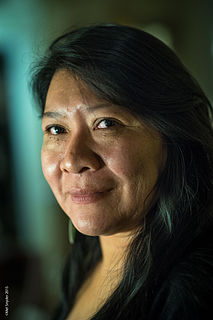
Joênia Wapixana is the first indigenous lawyer in Brazil and a member of the Wapixana tribe of northern Brazil. After taking a land dispute to the Inter-American Commission on Human Rights, Wapixana became the first indigenous lawyer to argue before the Supreme Court of Brazil. She is the current president of the National Commission for the Defense of the Rights of Indigenous Peoples.
Claudia Andujar is a Swiss-born Brazilian photographer and activist.
Candace Slater is an American academic and researcher specializing in Brazilian literature and culture.
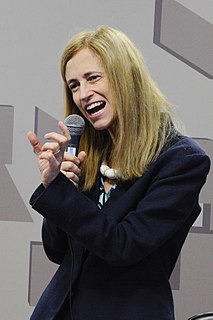
Cláudia Maria Costin is a Brazilian academic and civil servant.
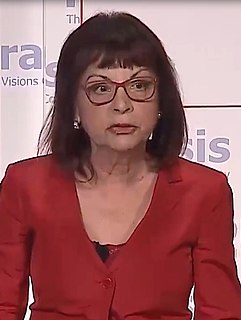
Maria Manuel Leitão Marques is a Portuguese politician of the Socialist Party who has been serving as Member of the European Parliament since 2019. She previously served as Minister of the Premiership and of Administrative Modernisation since 26 November 2015. From 2015 until 2019, she represented the Viseu constituency in the Assembly of the Republic. Marques was the Secretary of State for the Administrative Modernization under the XVIII and XVII Constitutional Government of Portugal.